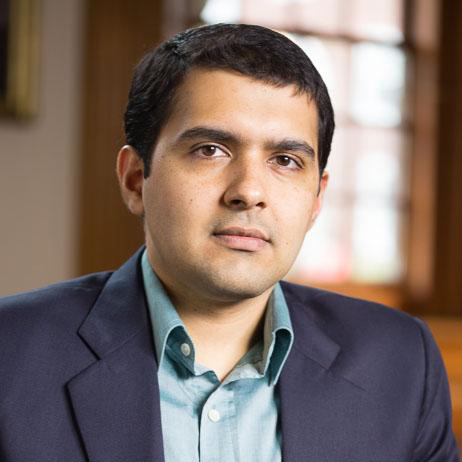Many think of work in the sharing economy, such as driving for Uber, as secondary—jobs that folks with some initiative are doing in their off hours to supplement income from a more steady position. In some cases, that’s true. But the reality is that many rely on these jobs for all of their income. Whether it’s from full-time work for one company or garnering a living wage from part-time work in several such positions, there are a lot of people who depend on job within the sharing economy to support themselves. For them, getting paid when they need it is crucial.
Our own Global Entrepreneur-In-Residence, Vivekdeep Gupta, hopes his company, Covrd, can meet this need. Initially targeted to people working in the sharing economy, clients sign up for Covrd by downloading the app. Then they are issued a Covrd card, which is how they receive the income earned for their work. The card and app work hand-in-hand, with the card offering access to their previous day’s earnings every morning and the app tracking their income daily.
Recently, I caught up with Vivek and got more insight on Covrd and the growing “fintech” sector of the innovation economy.
Q: Where did the idea for Covrd come from and how has it changed since you first started working on it?
Covrd was born out of our desire to solve social challenges using technology. The sharing economy offered an exciting new space, and we contemplated building a platform to provide health insurance and other benefits to freelancers in the sharing economy.
It was while riding in an Uber in Boston in December 2014, that the idea for Covrd first struck, or rather was pitched to us by our first customer. It was a just another ride, but as was common for them whenever riding around the city, it turned into a conversation about the startup. The Uber driver, Glen, was excited about getting insurance benefits, but had a more pressing concern – he wanted his money faster! Like most freelancers and employees, Glen received his earnings a week to 10 days after he completed rides, and his low account balance meant that he was often taking, or on the cusp of taking, a payday loan. Several more conversations and intense groundwork followed, and in early 2015, Covrd was born!
While the core idea has not changed much since its inception, the payment delivery mechanisms have evolved, especially our decision to provide our customers with a physical debit card in place of electronic fund transfers.
Q: The Covrd app has a physical component in the form of a debit card, issued to every user. What has your experience with bringing this physical component been like?
This has been the most challenging and time consuming aspect of the business, mainly because of the fact that we have to work with banks and payment processors, each of whom have their own cycle times. However, once this is implemented, we are confident that having a physical product will drive brand recall and allow us to create innovative programs for customer retention.
Q: Your company targets the sharing economy currently but there are opportunities to work with other independent contractors across various industries. What attracted you to target this segment first?
There are a few clear reasons why we chose the sharing economy. It is probably the fastest growing segment of the US workforce, it employs a younger workforce most of who are tech savvy, and, unlike salaried employees, workers in the sharing economy incur both personal and business expenses from their income which puts additional stress on their cash flows.
Q: What kind of response have you been getting from clients/users of Covrd?
We have observed clear demand for our product from the workers in the sharing economy. In fact, people have been recommending our service to their friends in the traditional economy as well!
Q: In recent years, the “fintech” sector has experienced incredible growth. What is it about the fintech sector that makes it so attractive to startup founders and investors alike?
The fintech sector suffers from massive inefficiencies. Some of these like the slow nature of payments, high interest rate loans, uneven lending benchmarks, and poor customer service affect regular users on a daily basis. Today, most of these problems can be solved by intelligent use of technology and this is one of the reasons that many entrepreneurs are attracted to this segment. The possibility of having a vast social impact (think PayPal and Square) is another reason many entrepreneurs like me are attracted to fintech startups.
Q: What’s next for you, for Covrd?
I think the next (and most important) challenge for us is growth. We have spent time in creating a product that addresses our customer’s needs. It’s now time to go out to the market and sell.
We are on the cusp of coming out of beta in our first market (San Francisco). It has been a long and arduous journey working with the existing financial services system but we expect to get there. The next several weeks will be intense as we customize our product and operations based on feedback.
